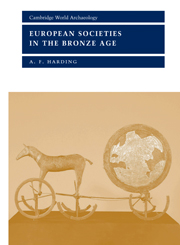Book contents
- Frontmatter
- Contents
- List of figures
- List of tables
- Preface
- 1 Introduction
- 2 The Bronze Age house and village
- 3 Burial
- 4 The domestic economy
- 5 Transport and contact
- 6 Metals
- 7 Other crafts
- 8 Warfare
- 9 Religion and ritual
- 10 Hoards and hoarding
- 11 People
- 12 Social organisation
- 13 The Bronze Age world: questions of scale and interaction
- 14 Epilogue
- References
- Index
3 - Burial
Published online by Cambridge University Press: 25 January 2010
- Frontmatter
- Contents
- List of figures
- List of tables
- Preface
- 1 Introduction
- 2 The Bronze Age house and village
- 3 Burial
- 4 The domestic economy
- 5 Transport and contact
- 6 Metals
- 7 Other crafts
- 8 Warfare
- 9 Religion and ritual
- 10 Hoards and hoarding
- 11 People
- 12 Social organisation
- 13 The Bronze Age world: questions of scale and interaction
- 14 Epilogue
- References
- Index
Summary
Since no elixir of life has yet been discovered, all humankind continues to end up as dust, ashes and bones, to the great advantage of archaeology. Bronze Age people were no more successful than anyone else at discovering the secret of eternal life, and consequently there are a lot of them available for study in skeletal or combusted form. Estimates of their numbers are necessarily little more than guesses, but there is no doubt that the surviving buried population of the Bronze Age is much greater than that of the Neolithic, and probably on a par with that of the pre-Roman Iron Age. It is a huge resource for study.
Traditionally, the study of burials has been a popular activity for Bronze Age scholars, but over the years their preoccupations have changed. Originally the quest for grave-goods was all-important; these were then catalogued and divided into types. Later, this information was combined with that on age and sex, and with statistics on orientation and grave form, to produce ‘combination tables’ which aimed to show the associations of each object. This led directly to the production of chronological charts through the use of seriation techniques. En route, many individual studies of artefact types were possible, especially for unusual or well-represented types. Such studies have also led to the study of social status, intra- and extra-societal relationships, the evolution of social and political systems, and the relationship between archaeological artefacts and kinship structures.
General studies of burial have usually been concerned with the information potential of the evidence, and specifically with what burial can say about social organisation in the society from which the dead came.
- Type
- Chapter
- Information
- European Societies in the Bronze Age , pp. 73 - 123Publisher: Cambridge University PressPrint publication year: 2000



